Chatting about chocolate with La Petite Artisan Chocolate
Our Business Specialist librarian interviews small Wellington businesses. Today we are happy to have La Petite Artisan Chocolate.
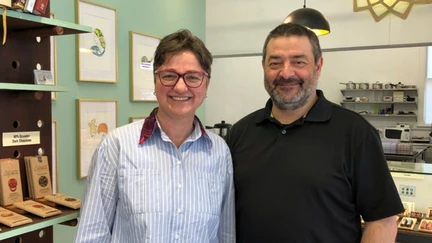
“In ten years time we’d like to see La Petite as a solid, established icon for Thorndon and Tinakori Rd. That would be a very, very satisfying goal. When the ships are coming in and for people visiting the Botanical Gardens, if they think “Oh, we need to see La Petite”, and we become a destination, that’s probably a good target for me. - Sel Gider, La Petite Artisan Chocolates
To walk into La Petite on Tinakori Road is to be literally like a kid in a chocolate shop. There are the beautiful displays of chocolate bars with original artwork by local artists, a French aesthetic with a bicycle parked against the wall, the well-lit counter cabinet twinkling with coloured bonbons and of course, the smell. A pervasive sweet, yet spicy, aroma of dark chocolate that sets the taste buds tingling...
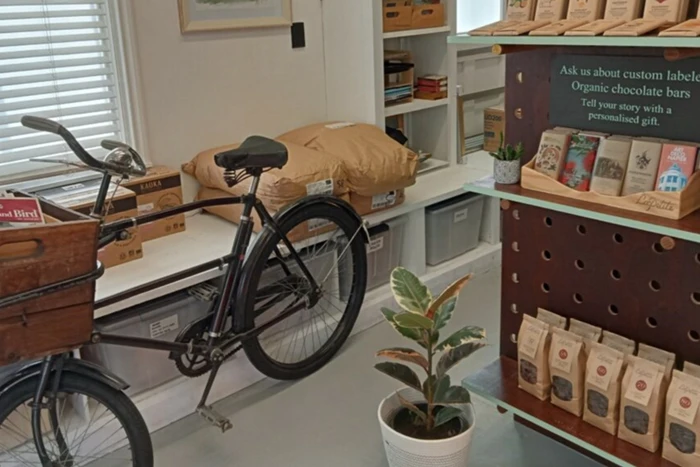
First, a little history.
New Zealanders have been enjoying chocolate manufactured in Aotearoa ever since Richard Hudson set up his chocolate and cocoa manufacturing plant in Dunedin in the 1880s. Hudson’s factory was later taken over by Cadburys and became a Dunedin landmark.
More than a decade later Whittakers chocolate set up shop in Christchurch before relocating to Wellington.
For generations of New Zealanders chocolate meant Dairy Milk or Milky bars. Dark chocolate was marketed as “Energy” chocolate. Boxed chocolates such as Roses or Cadbury's Continental were for "special occasions" such as Christmas, and no trip to the cinema was complete without a box of Snifters or Jaffas.
Then in the 1990s a different type of chocolate began appearing on the New Zealand market. High end, quality, boutique chocolates with their makers trained in the European chocolate style. These artisan chocolate makers and chocolatiers were dedicated and passionate about their craft and businesses continued to expand through the 2000s.
Here in Wellington/Te Whanganui a Tara the newest entry into the artisan chocolate market, La Petite , opened the doors of it's chocolaterie in October 2022.
Run by Asli and Sel Gider, La Petite specialises in organic, fairtrade, single origin artisan chocolate bars, bonbons and drinking chocolate, with an emphasis on sustainability and collaboration with local producers.
Leaving Turkey and settling in Hawkes Bay over a decade ago, Asli and Sel both have backgrounds in food production; Asli as a winemaker and Sel as a food processing engineer in the apple industry.
2020 and the early months of lockdowns when neither was able to work, gave them time to think about what they wanted their future to look like. And that future involved a business where they could work together utilising their skills to turn some of New Zealand's high quality produce into an artisan product.
When a local chocolate business came onto the market at around the same time they decided to make the leap ....
Surrounded by displays of mouth watering, handcrafted chocolates WCL recently sat down with Asli and Sel to talk about taking on a business at the beginning of the tumultuous Covid era, relocating it to Wellington and why connections with suppliers are important.
Asli : We always loved Wellington and wanted to move here but with our jobs it was not possible. So when we decided to stop and do something for ourselves we saw our favourite chocolate business was on sale …
Sel : Straight after the lockdown we sat around the table, discussed all the details and took over the brand. In the back of our minds we were always planning to shift but we spent a year and a half or so in Hastings where the business was originally located.
WCL : Did you receive mentoring from the business owners?
Sel: A little bit. They were still around but we picked up pretty quickly. And then we started looking in Wellington. We had to find a location for the business and that search period took quite a while because things were stop-start with lockdowns. It took about a year or so. I was driving down to Wellington pretty much every week to look at places and to look at the suburbs, observe the people.
Asli: But Thorndon, especially Tinakori Village, was on our minds from the first because I think it suits our brand image a lot.
Sel : Last year in June we found this shop, moved in in September, did a bit of fit out work and we opened in October.
WCL : You were gifted some artwork when you moved into this space. Tell us a little about that.
Sel: It's Sir Michael Fowler’s painting. This building used to be his workspace back in the day, and he drew this from across the street. One of our customers gifted this to us.
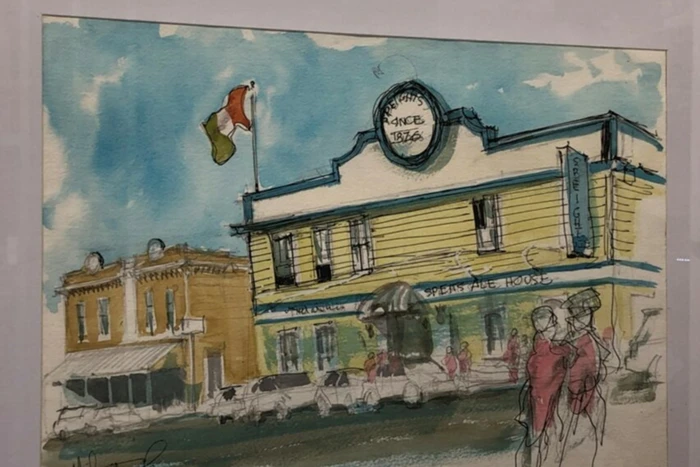
Asli : This is the chronological side but story wise – Why chocolate? We wanted to work as a couple and bring our expertise into our business. Food production was something we had in common. I always wanted to have a shop where I can connect with people through my creations. Also chocolate is similar to wine, the terroir is important, then it is the combination of science and art.
Before taking the big leap, we bought all the chocolates we can find in New Zealand and tasted them, blind tasting. If the chocolate was not good it would not work for us. We loved La Petite chocolate. The couverture was French origin, from an organic and fair trade certified family business.
For us the most important part of the business, the quality of the chocolate, was ticking the box. So we brought our scientific minds and taste buds and built up the rest of the business from there.
Hastings was a good start for us because local people were very supportive, especially after covid and we felt that we were making people happy by chocolate. They were always coming smiling. I never saw a rude person in the shop. They were happy and when they gifted our chocolate to someone else, they were happy. Gifting a local artisan produce creates a positive community vibe and that’s what we love about La Petite.
At first, chocolate for me was the bars. I tried to differentiate the origins, getting better at tasting. I honestly did not know anything about the pastry side, the confections. I am making up for it now. Chocolate has become my world and I wouldn't have it any other way.
The bonbons, the small, soft centered chocolates, I discovered when we took over this business. Now I feel creating different tastes with different ingredients is the fun part. I love creating gift boxes with different shapes, colours and flavours. They bring joy to our lives.
Creating bonbons requires a lot of work but it is fun. The flavour combinations are endless. We look for balance, harmony, flavour and stability. Just one bite should be satisfying and fulfilling.
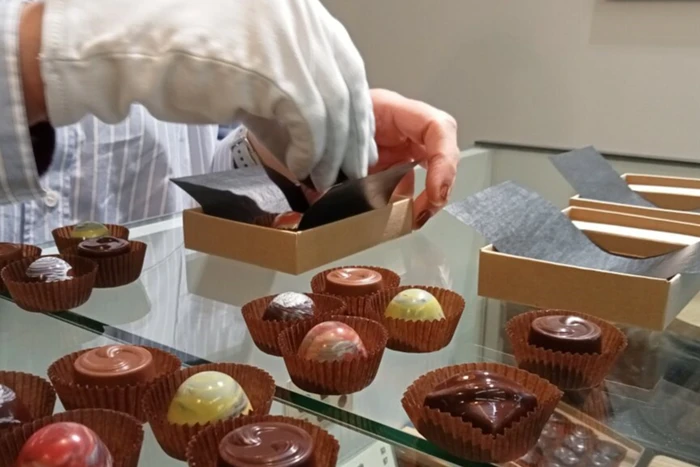
WCL : There are pros and cons to setting up a business vs buying an existing one. Did you weigh these up?
Asli : We had a lot of synergies with the previous owners in terms of the ethical and artisanal side of the business. The chocolate is ethical and the packaging is plastic free and compostable. All hand made in the kitchen. So we thought the core values were right..
Sel : Having a brand name that people knew and trusted was obviously a big benefit rather than trying to create something from scratch. There was also room for improvement, especially in terms of the branding, the packaging and putting the scientific, technical function into production. And also with the plan in the back of our minds of moving this to a bigger city and a bigger audience was one of the main things.
And the cons : obviously there were some set practices in the way things were done historically and when we started we had to go through everything and dig out what’s right for us and what’s not, and how can we make it better. Is it the right way doing it this way or do we change it. So changing the habits , not just the people but the business practices.
Having a brand name that people knew was obviously a big benefit rather than trying to create something from scratch.
WCL : You said earlier you wanted to work together. How are you finding it? Do you have complementary strengths and skills?
Asli : It’s very good, I think. We are very, very different from each other and we complement each other a like. I really like how Sel works that’s why I always wanted to work with him. He’s a perfectionist in his own way. He has a very good eye for the detail and I am a perfectionist in my own way, but in different areas.
Sel : In terms of the taste and the art side of it, the recipes and the kitchen, the preparation and the inspiration for the brand, Asli is the driving force. I am more on the admin, invoicing, the technical labelling, the machines.
Asli: He’s a very DIY person. It’s his pleasure if he can do something by himself. I think that’s why he likes this business a lot.
Sel: On the other hand, one thing that maybe affects us is that it’s never ending. We come here in the morning together, we work together, we go home together. There’s no such thing as work hours. At dinner we are discussing things about work.
Asli : I don’t have work life balance. This is like a third child for me.
WCL : Have you found previous Hawkes Bay customers have switched to online purchasing or coming to see you when in Wellington?
Sel : Yes, they have.
A lot of Hawkes Bay people have connections in Wellington, like kids studying here. We sometimes have people visiting us here as they know us from Hastings. Also Wellingtonians go to Hawkes Bay so there are a lot of people who know us from the Farmers market [and those] people have found us here.
We have a lot of corporate customers from Hawkes Bay as well.
Straight after lockdown in the second half of 2020 there was a big boom then starting from last year, things started to change as things started to settle down. In terms of the corporate side, the businesses were much more comfortable doing gifting and staff events but now it seems like it has settled down a bit So that is obviously having an effect on the volumes.
We have maintained the customers as in the number of customers but the volume is not what it has been.
Asli: From the start we said we really shouldn’t rely on foot traffic. When people need gifts or a small treat for themselves, they come here. Loyal customers are more important for us than the busy foot traffic. We are lucky to have car parks at the back.
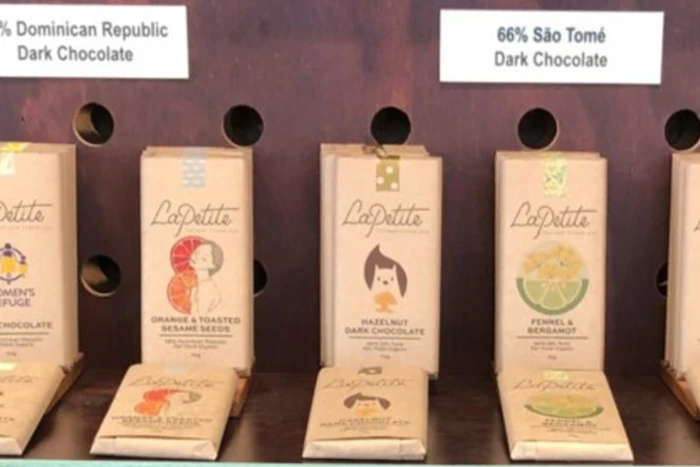
WCL : Have you noticed different taste preferences between the two markets?
Asli : If we try something new here people are always curious. Wellington people are more open to discover new tastes. There’s a more culturally diverse group here.
Sel : We are finding that some of the flavours that were not very popular in Hawkes Bay have become more popular here.
WCL : Supporting local and collaborating is important to you. Tell us more about local inspiration and collaborations
Asli : We try to source our ingredients from New Zealand as much as we can and we really like collaborations with growers. So when I find a good producer like, for example, salt, why use ordinary salt if you have good salt producers in New Zealand? Chilli is the same. There might be a very, very good chilli in the market, a Mexican chilli, but if we have good producers, who try to do their best in New Zealand I just go there. I tasted a lot of chillies to find the best one for us. It’s the same with honey, coffee, hazelnuts, fruits and herbs. In New Zealand we have the best climate and the best soil. Growers are passionate about their products so from the beginning it was my aim to work with the producers in New Zealand.
Also, most of our label artwork was created by local artists. It first started with Rachael. I saw her work on the street on a pamphlet and I contacted her “Do you want to create an artwork for the label of one of our chocolates?” and she tasted the chocolates – it was ginger mandarin …. and prepared a design. She ended up creating three artworks for us.
Then there is Ana from Nelson. Her style is unique and beautiful and truly connects you with the chocolate.
Caramel Crystals was a difficult one. We went to Castle Point during Christmas holidays and the landscape inspired me with the idea and I found Helen’s artwork online. She is also the designer of our white bar, Tangy.
Lastly, we met Helen Cairney. I love her nature inspired, hand painted gift cards that we sell at our shop. She designed the Fennel and Bergamot artwork for us.
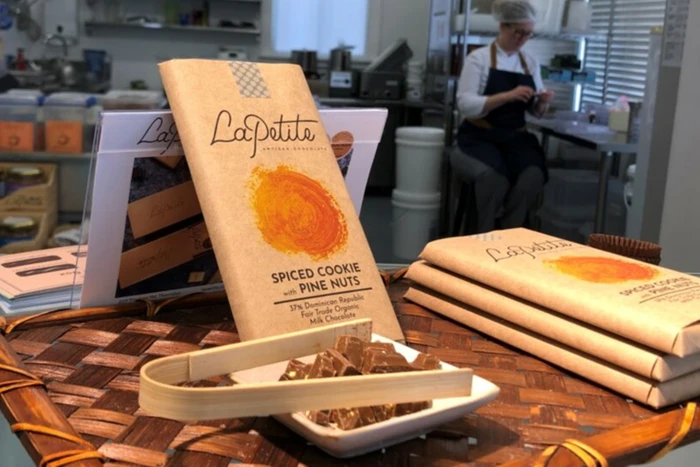
WCL : How much experimentation goes in to perfecting a new chocolate flavour?
Asli: Yesterday my husband was joking. He told me “I will change the sign outside to say Research Department” because we are always researching. We are always evolving and trying to do better.
We work in small batches and have the opportunity to try something different in each production. We know our weaknesses and strengths in tasting, so we decide as a team. Also I value the feedback from the customers. They help us to perfect the new chocolate flavours.
In New Zealand one thing I have observed is that if people say of a flavour “It’s subtle” it means “It’s not enough”. They don’t say this openly, they say “It’s subtle”. Then I know that I should go a bit more bold.
WCL : Do New Zealanders still need a degree of educating about quality chocolate? How to savour and appreciate it?
Asli: We are lucky in New Zealand to have all these talented artisan chocolate makers and chocolatiers. New Zealanders have the chance to train their palate with high quality chocolate. The one thing that needs more emphasis maybe is the pricing of the chocolate. It is not possible to buy ethical, high quality chocolate at supermarket prices. Cheap chocolate means low quality ingredients and some people are suffering along the supply chain of the ingredients that go into the chocolate process. High quality chocolate has a higher price but has more complex, satisfying taste and is ethically correct.
WCL : Your chocolate is award winning. To a boutique chocolaterie what does it mean to be judged and awarded medals by your peers in the industry?
Asli: It was very good timing as it was just as we moved here. It was with Dr Beak we got most of the awards. That’s the bar we created with the gin botanicals in collaboration with Dr Beak Premium NZ Gin. We’ve put a lot of effort into it so it was a really proud moment for us.
Sel: Obviously it’s very good for getting the name out - we are here and doing this and doing it well. Asli appreciated the feedback from the judges – what’s good, what’s not so good and what can be improved on.
WCL : Let’s touch on the darker side of the chocolate industry. Many people are not aware that there are many unethical practices associated with the chocolate supply chain (such as child labour). What steps have you taken to address this?
Asli : At La Petite we use Kaoka couverture for our chocolates. They are organic and fair trade certified and we have always been happy with their quality standard. Kaoka’s fair trade certification is from Fair For Life. It is a fully transparent, global certification for social accountability and fair trading. It protects farmers at the origin and guarantees fair practices along the entire supply chain.
WCL : What plans do you have for future developments?
Asli : I have a lot of dreams. I’m more of a dreamer.
Sel: What we are not planning is to be a big brand. We have no such aims. We are not planning to be in every supermarket. We are aiming to remain within the boundaries of being boutique.
Asli: Maintain the quality always. That’s the first thing. That’s how we are keeping our customers. Even if the ingredient prices are increasing every day, we can’t compromise the quality.
Sel : In ten years time we’d like to see La Petite as a solid, established icon for Thorndon and Tinakori Rd. That would be a very, very satisfying goal. When the ships are coming in and people visiting the Botanical Gardens, if they think “Oh, we need to see La Petite”, if we can make people think that and we become a destination, that’s probably a good target for us.
Reading list